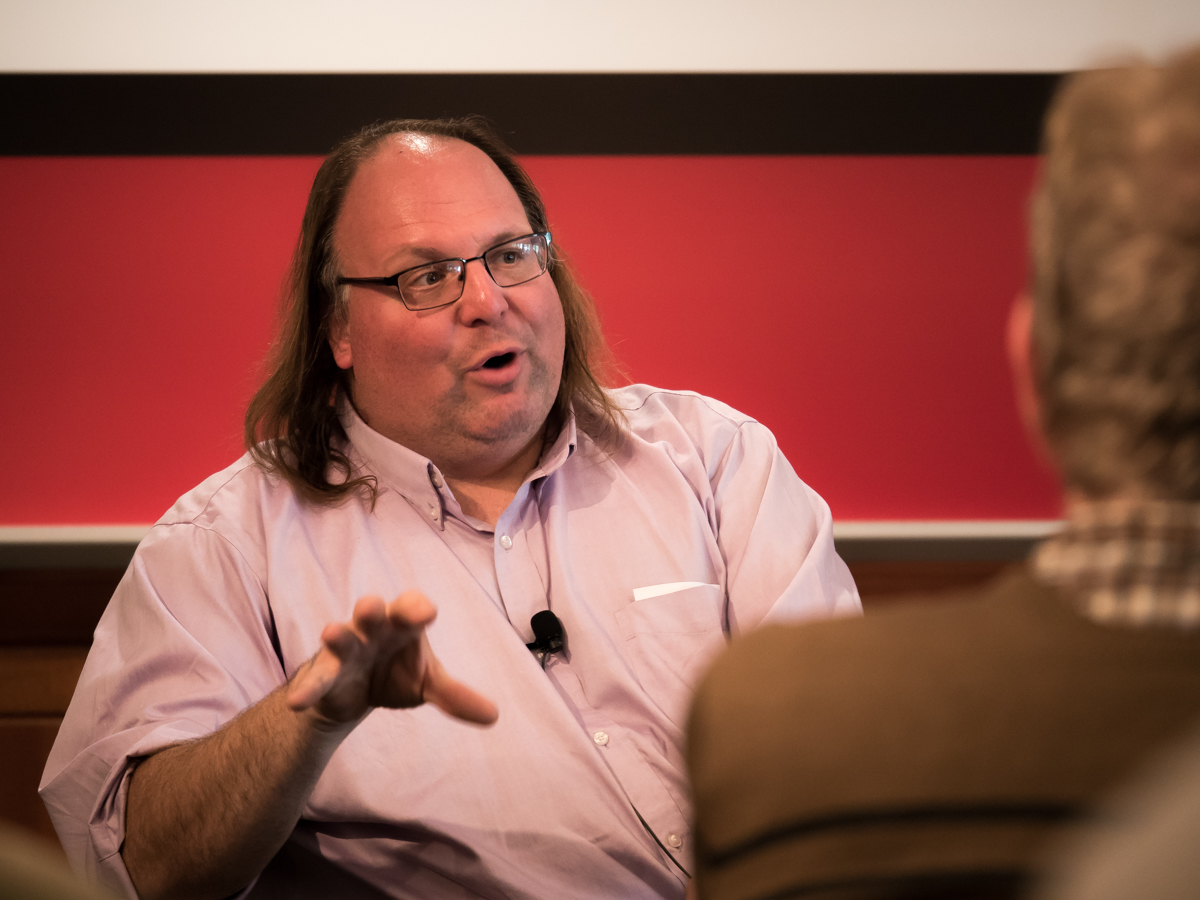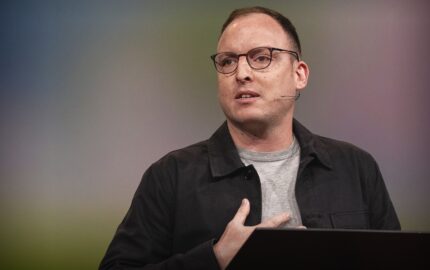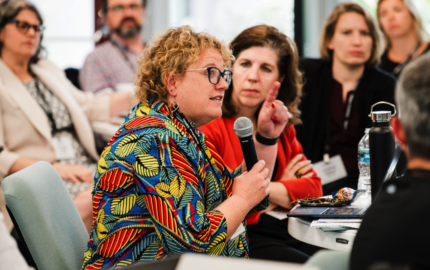Ethan Zuckerman is the director of MIT’s Center for Civic Media, where he is also a principal researcher, and he is the cofounder of the international citizen media blogging community Global Voices. Prior to joining MIT in 2012, Zuckerman was a fellow at Harvard University’s Berkman Center for Internet and Society for more than eight years.
A Knight-funded initiative, the Center for Civic Media works with communities to create, utilize, and assess media tools and practices in order to strengthen social bonds and civic engagement. The Center’s work can take the form of everything from traditional journalism to technologies for community empowerment, such as phone-texting systems that allow instant and sophisticated votes on daily activities.
Zuckerman, who defines civic media as “media that you make and put out in the world with the goal of having some sort of social change,” says he came to MIT with the intention of trying to "fix" journalism. However, a couple years in, he realized journalism isn’t the problem—civics is. “What I found myself wanting to do was try to fix this problem of, ‘Why do so many people feel powerless so much of the time?’ That’s the problem I’m interested in now.” His research focuses on the use of new media technology by activists, the distribution of attention in both mainstream and new media, and the utilization of technology for international development.
Zuckerman visited the Nieman Foundation in October and spoke with fellows about business models, his dislike of Facebook, and participatory versus traditional media, among other things. Edited excerpts from that conversation:
On participatory vs. traditional media
If we were having this conversation ten years ago, we would be having the bloggers versus journalists debate. We would have been having this painful argument of, “Who are you barbarians knocking at the gates? How is this going to change the institution?”
What's happened is, in a funny way, each side has absorbed the other. The art of producing journalism looks a lot more like what bloggers and other media makers are doing. We've got people not just writing stories, but also making videos, making audio. Putting it up directly on the web. Writing in a combination of a more informal tone and more formal and edited tones. In that sense, a lot of what's come out of the participatory media realm has infected mainstream journalistic culture.
We also have the way in which participatory media has ended up, in many ways, being the inputs and then the sources into mainstream media as we know it. Everyone's gotten comfortable with the idea that at least story ideas are going to come from participatory media on the ground.
The ugly versions of this are when someone from CNN is Tweeting to someone who is in the community college being shot at in Roseburg, Oregon, saying, "Would you please follow me so I can DM you?"
What that really reflects is this realization, which makes perfect sense, that journalists can't be everywhere at any time. So, in many cases, someone on the ground with a camera, with a phone capable of those observations, is going to be the front line in all of this.
On the loss of blogs
Blogs, at their heart, have a lot of characteristics that are going away. They had stable URLs, so you could access them from anywhere, on any web browser. They were not particularly tied to any platform like Facebook or Google.
This phenomenon that the press is finding is a sort of "appification" of the world. You now have to have a special relationship with Facebook if you want to get read.
If you're The New York Times or even The Seattle Times or The Houston Chronicle, you can do that. If your outlet is "My Heart's in Accra," my blog, you're not going to get that special relationship.
I fear we're watching the end of a golden age. I think we have had this explosion of diversity—once again, not as much as we should have or want to have, but quite a bit more than we did maybe twenty years prior. Now I'm worried that we're going to see that space collapse a little bit, if not quite fully.
It's not a bad moment to be a reader. There's an awful lot of good content out there, and if you know where to look, it's often much, much more diverse than it would have been in earlier days.
It is, though, not always a great time to be a writer, not a great time to be an editor, not a great time to be a publisher.
Unfortunately, what I don't think these platforms are actually fixing is something that I refer to in articles as the original sin of the Internet: This assumption that advertising and targeted advertising is the right way to support this economy.
It's not a bad moment to be a reader. There's an awful lot of good content out there, and if you know where to look, it's often much, much more diverse than it would have been in earlier days
On two business models
I feel like there are two threads in the media financial model that we can pursue. There's the newspaper model and there's the public radio model.
The newspaper model basically was making its money off of subscription with advertising as a sweetener on top of it. What it means when you follow that model is that you try to get people back to the subscription model and you do it by putting up a paywall. Why do I subscribe to The New York Times? Because I read more than ten articles a month. I do not subscribe to The Berkshire Eagle, which is my hometown paper. Because you know what? I'm not going to pay to climb over that particular paywall.
But the Times makes me feel like they're tailing me in the aisles, like I'm in danger of stuffing extra articles down my pants.
My subscription gives me access on the web and on my mobile phone, but not my iPad, because that would be extra. Then I try to put things into Instapaper to read them, and it tracks me.
The whole model of it is basically, "You are a thief stealing our content. Don't you understand you must pay us to get around it?"
The public radio model is, "We can't charge you for any of this, so we have to beg you. Because we have to beg you, we're going to thank you."
Once you do it, you feel good about the experience.
Podcasts, which are built around that donation model with advertising as the icing on top, rather than a subscription model with the advertising icing on top, actually seemed to be doing reasonably well.
They’re doing it from this assumption that things are going to be free in a digital world. You want them to be free. Because you want people to share it and you want them to pass them around. You want them to love you, not to need you.
On the double bottom line
Journalistic organizations, the way we've structured them—at least in the United States—are dual bottom line organizations: They need to be fiscally sustainable, and they need to have a civic impact.
This birth of digital‑first, eye‑catching media isn't in many cases paying much attention to that civic bottom line. It's great that we're seeing more people writing. It's great that we're seeing more interest. It's great that we're seeing more forms of storytelling, but we've got to start asking those questions about the civic impact of it as well. Because, at the end of the day, this is a lousy profession to be in if you just want to make money. Unless you're actually interested in that double bottom line, this is probably the wrong business to be working in.
On micropayments
For me, I would start building micropayments around models where I can monitor my own behavior.
We've built a lot of tools in my lab that let you look at what you're reading online so you can ask questions about how globally diverse it is.
Those systems also turn out to be great self‑surveillance system. At the end of the month, you could say, “I think I should be paying about twenty bucks a month for content. Who should I be giving it to? Well, I should be giving this much to the Times, and I probably should be giving this much to Reddit, and I probably should be giving this much to Mother Jones in this particular week where I've been doing a lot of work on gun violence.”
That's one way to go ahead and do this. But there are countless other ways to do it. No one sane is going to tell you that they actually have the right answer.
What I do think sane people can start saying to us is that we can't legislate or cling onto this model that users hate.
On killing Facebook
Facebook, for better or worse, has a long track record of censorship from the absurd to the offensive—whether it's censoring breastfeeding pics, or whether it's making it impossible for anyone who's part of the Rohingya minority in Burma to use the network—not necessarily through any fault of theirs, but through people figuring out how to exploit their internal systems to make sure that no one's able to publish.
At the same time Bitcoin is a disaster—it is a terrible, terrible system—but the reason we're all paying attention to it is it's done something really interesting. It's basically said, maybe we could have a system that works a lot like money, but doesn't have to have a central bank.
It does that through a central ledger where you can see, "I just gave you this token, which means I can't give you this token." If we don't have that ledger, we have what's called the double spending problem.
What's cool about this ledger is that it doesn't just live on one computer and it isn't controlled by one person. It's distributed to all the people who are Bitcoin users.
So I'd like to kill Facebook, and my plan to kill Facebook is actually pretty straightforward: I'd like people to be able to publish on their own Web servers, but I'd like all of those threads to knit back together into something that looks and feels a lot like Facebook. Rather than Facebook owning your words and Facebook owning your relationships, you would own your words and you would own your relationships.
What you decide to put on the front page is necessarily political
On setting the agenda
One of the incredible powers that journalists and, particularly, editors have at the moment is agenda setting. This ability to say, here's something we should be paying attention to.
Politicians have agenda setting power; if Obama stands up and says, "Today, we're going to talk about gun violence," then today we're going to talk about gun violence. But so does the press.
That's really the editorial decision—what's going on the front page? What are we going to throw resources at? What are we going to do a deep investigation into? We know that social media dialog feeds heavily off of press dialog. It goes both ways, but we know that the press can lead other discussions.
We've even seen it around things like Vietnamese nail salons in New York City. There are ways in which putting something on the agenda turns it into a conversation. That is inherently, in my mind, a political decision.
You won't be surprised that I reject a lot of notions of journalistic objectivity. This is the area in which I reject it more than anything else. Absolutely, what you decide to put on the front page is necessarily political.



